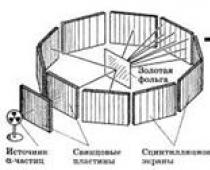Accentuations- overly expressed character traits. Depending on the level of expression, there are two degrees of character accentuation: explicit and hidden. Explicit accentuation refers to extreme variants of the norm, characterized by the constancy of traits of a certain type of character. With hidden accentuation, the traits of a certain type of character are weakly expressed or do not appear at all, but can clearly manifest themselves under the influence of specific situations.
Accentuations of character can contribute to the development of psychogenic disorders, situationally determined pathological behavioral disorders, neuroses, and psychoses. However, it should be noted that character accentuation cannot in any case be identified with the concept of mental pathology. A rigid boundary between conventionally normal, “average” people and accentuated personalities does not exist.
Identifying accentuated individuals in a team is necessary to develop an individual approach to them, for professional guidance, assigning to them a certain range of responsibilities that they are able to cope with better than others (due to their psychological predisposition).
The main types of accentuation of characters and their combinations:
- Hysterical or demonstrative type, its main features are egocentrism, extreme selfishness, an insatiable thirst for attention, the need for veneration, approval and recognition of actions and personal abilities.
- Hyperthymic type - high degree of sociability, noisiness, mobility, excessive independence, tendency to mischief.
- Asthenoneurotic- increased fatigue when communicating, irritability, a tendency to worry about one’s fate.
- Psychosthenic- indecision, tendency to endless reasoning, love of introspection, suspiciousness.
- Schizoid- isolation, secrecy, detachment from what is happening around, inability to establish deep contacts with others, unsociability.
- Sensitive- timidity, shyness, touchiness, excessive sensitivity, impressionability, feelings of inferiority.
- Epileptoid (excitable)- a tendency to repeated periods of melancholy-angry mood with accumulating irritation and a search for an object on which to vent anger. Thoroughness, low speed of thinking, emotional inertia, pedantry and scrupulousness in personal life, conservatism.
- Emotionally labile- extremely changeable mood, fluctuating too sharply and often for insignificant reasons.
- Infantile-dependent- people who constantly play the role of an “eternal child”, who avoid taking responsibility for their actions and prefer to delegate it to others.
- Unstable type- constant craving for entertainment, pleasure, idleness, idleness, lack of will in study, work and fulfilling one’s duties, weakness and cowardice.
You can often find people who have a noticeable predominance of one character trait. Some are very restless, others are too pedantic, others are overly sarcastic, etc. This one predominant character trait can be considered at the same time both as a talent and also as a human flaw. A certain character trait presupposes a certain strategy of behavior characteristic of a given individual. So, for example, a pedantic person, as a rule, is assiduous and neat; a person prone to demonstrativeness strives for brightness and attractiveness.
In psychology, the predominant character traits of a person that are on the borders of the clinical norm are called accentuation. Accented individuals can achieve significant success in science, culture, sports, political activity, etc. However, these people also often encounter psychological difficulties in cases where situations arise that are opposite to their personality traits. Avoiding such situations can be difficult, and in order to overcome difficulties and discomfort in communication, you need to consult a psychologist to receive qualified help.
An accentuated personality can be selectively vulnerable in relation to some psychogenic influences, while to others, fairly good stability is maintained. Accentuations are not mental disorders, however, some properties are similar to those and this suggests the presence of connections between them. An accentuated personality experiences difficulties in maintaining a normal lifestyle. To identify accentuations, psychologists use special tests and psychological questionnaires. This work is carried out by practical psychologists who have higher psychological education.
In general, accentuation is " extreme variant of the norm" Accentuations include a group of persistent, pointed character traits of a person, congenital or acquired. The negative side of this problem can be minor disruptions in relationships with people, as well as adaptation in the outside world.
With accentuation, a disturbance of mental balance usually occurs; the depth of this disturbance depends on the degree of expression of some mental properties and the insufficient development of others. Excessive emotional excitability may occur in the absence of a person’s control over his own behavior, as well as reactions that were caused by emotional reasons. Anxiety, suspicion and uncertainty arise in the absence of an adequate assessment of current events, as well as a loss of sense of reality. A person’s behavior may manifest selfishness, excessive claims to one’s own importance in the absence of the necessary abilities and opportunities.
All these character traits can be inherent in a mentally normal person. However, in this case, they are balanced by other character traits and therefore appear more balanced. Harmony and disharmony are broader concepts used to qualify the mental states of a person. We can talk about a person as a harmonious personality if there is an optimal combination of his mental and physical properties. It is noted that in people with accentuations in the nature of the combination of these properties complicate social adaptation.
Psychologists consider those personality traits that prevent a person from being socially active and adapting in society as a violation. The potential of a person with accentuations to socially adapt depends on the degree of personality disharmony and factors of the surrounding reality.
In favorable conditions accentuated personality feels satisfactory, that is, under these conditions the person is in a state of compensation. And, on the contrary, in unfavorable conditions a person may experience painful manifestations - anxious, neurotic. In such cases, a person needs a qualified person who will help the person overcome his problems and adapt to the social environment.
Accentuation of character is the most complex type of norm on the verge of mental illness, which is characterized by inharmonious personality development: some traits will be overly expressed and sharpened, while others will be too suppressed. The concept of character accentuation in psychology was developed as an “accentuated personality,” but was later narrowed to the indicated option.
Personality character accentuations: stages
In the course of diagnosing character accentuations, two types of accentuations are distinguished, which differ in severity:
- Hidden accentuation. This is a common option in which negative character traits make themselves felt only in individual, difficult situations, despite the fact that in ordinary life a person can be quite adequate.
- Explicit accentuation. This phenomenon is a borderline variant of the norm. In this case, usually throughout a person’s life, in almost any situation, the manifestation of problematic character traits can be noted. A pronounced accentuation in everyday life is usually called “psychopath”.
This general description of character accentuations allows us to distinguish between concepts and give a more correct assessment of a person’s condition.
Accentuations of character and psychopathy
There are special criteria that make it possible to distinguish the accentuation of a person’s character as the boundary of normality from pathology. There are only three of them:
- A character is called pathological if it is stable and practically does not change throughout life.
- The degree of negative character manifestations is also very important for diagnosis. If a person has psychopathy, then he displays the same negative traits everywhere, at work, at home, in his close circle, and among strangers. If a person changes depending on conditions, then we are talking specifically about the peculiarities of character accentuation.
- The most striking sign is the emergence of difficulties due to the character of both the person himself and those around him. If the traits do not interfere with social adaptation, then we are not talking about psychopathy, but about accentuation.
Such signs make it possible to differentiate concepts and determine whether a character is the norm or not.
Leonhard's theory of accentuated personalities quickly proved its validity and usefulness. However, its use was limited by the age of the subjects - the questionnaire for determining accentuation was designed for adult subjects. Children and adolescents, lacking relevant life experience, could not answer a number of test questions, so their accentuations turned out to be difficult to determine.
The domestic psychiatrist Andrei Evgenievich Lichko took up the solution to this problem. He modified it for use in childhood and adolescence, reworked the descriptions of the types of accentuation, changed the names for some of them and introduced new types. A.E. Lichko considered it more appropriate to study accentuations in adolescents, since most of them are formed before adolescence and are most clearly manifested during this period. He expanded the descriptions of accentuated characters with information about the manifestations of accentuations in children and adolescents, and the changes in these manifestations as they grow older. Peru A. E. Lichko owns the fundamental monographs “Adolescent Psychiatry”, “Psychopathy and Character Accentuations in Adolescents”, “Adolescent Narcology”.
Accentuations of character from the point of view of A. E. Lichko
A. E. Lichko was the first to propose replacing the term “personality accentuation” with “character accentuation,” citing the fact that it is impossible to unite all a person’s personal characteristics by defining only accentuation. Personality is a much broader concept, including worldview, characteristics of upbringing, education, and response to external events. Character, being an external reflection of the type of nervous system, serves as a narrow characteristic of the characteristics of human behavior.
Accentuations of character according to Lichko are temporary changes in character that change or disappear in the process of growth and development of the child. However, many of them can turn into psychopathy or persist for life. The path of development of accentuation is determined by its severity, social environment and type (hidden or obvious) of accentuation.
Like Karl Leonhard, A.E. Lichko considered accentuation a variant of character deformation, in which individual traits become excessively pronounced. This increases the sensitivity of the individual to certain types of influences and makes adaptation difficult in some cases. At the same time, in general, the ability to adapt remains at a high level, and with some types of influences (that do not touch the “place of least resistance”), accentuated individuals cope more easily than ordinary ones.
A.E. Lichko considered accentuations as borderline states between normality and psychopathy. Accordingly, their classification is based on the typology of psychopathy.
A. E. Lichko identified the following types of accentuations: hyperthymic, cycloid, sensitive, schizoid, hysteroid, conmorphic, psychasthenic, paranoid, unstable, emotionally labile, epileptoid.

Hyperthymic type
People with this accentuation are excellent tacticians and poor strategists. Resourceful, enterprising, active, easy to navigate in rapidly changing situations. Thanks to this, they can quickly improve their professional and social position. However, in the long term, they often lose their position due to the inability to think through the consequences of their actions, participation in adventures and the wrong choice of comrades.
Active, sociable, enterprising, always in a good mood. Children of this type are active, restless, and often play pranks. Inattentive and poorly disciplined, teenagers of this type are unstable students. Conflicts with adults often arise. They have many superficial hobbies. They often overestimate themselves, strive to stand out and earn praise.
Cycloid accentuation of character according to Lichko is characterized by high irritability and apathy. Children prefer to be alone at home instead of playing in the company of peers. They experience any troubles hard and become irritated in response to comments. The mood changes from good, elated, to depressed at intervals of several weeks.
With growing up, the manifestations of this accentuation usually smooth out, but in some people they can persist or remain stuck for a long time in one stage, often a depressed-melancholic one. Sometimes there is a connection between mood changes and the seasons.

Sensitive type
It is highly sensitive to both joyful and frightening or sad events. Teenagers do not like active, active games, do not play pranks, and avoid large companies. They are timid and bashful with strangers and give the impression of being withdrawn. They can be good friends with close friends. They prefer to communicate with people younger or older than them. Obedient, love their parents.
It is possible to develop an inferiority complex or difficulty adapting to a team. They place high moral demands on themselves and the team. They have a developed sense of responsibility. They are assiduous and prefer complex activities. They are very careful in choosing friends, preferring older ones.
Schizoid type
Teenagers of this type are withdrawn, preferring loneliness or the company of elders to communicating with peers. They are demonstratively indifferent and not interested in communicating with other people. They do not understand the feelings, experiences, condition of others, and do not show sympathy. They also prefer not to show their own feelings. Peers often do not understand them, and therefore are hostile towards schizoids.
Hysteroids are distinguished by a high need for attention to themselves and egocentrism. Demonstrative, artistic. They do not like it when someone else pays attention to them or praises others. There is a high need for admiration from others. Teenagers of the hysterical type strive to occupy an exceptional position among their peers, attract attention to themselves, and influence others. They often become the initiators of various events. At the same time, hysterics are unable to organize those around them, cannot become an informal leader, or earn authority among their peers.

Conmorphic type
Children and adolescents of the conformal type are characterized by a lack of their own opinion, initiative, and criticality. They willingly submit to groups or authorities. Their attitude in life can be characterized by the words “be like everyone else.” At the same time, such teenagers are prone to moralizing and are very conservative. In order to protect their interests, representatives of this type are ready for the most unseemly actions, and all these actions find explanation and justification in the eyes of a conforming personality.
Psychasthenic type
Adolescents of this type are characterized by a tendency to reflect, introspect, and evaluate the behavior of others. Their intellectual development is ahead of their peers. Their indecision is combined with self-confidence; their judgments and views are categorical. At moments when special caution and attentiveness are needed, they are prone to impulsive actions. This type changes little with age. They often have obsessions that serve as a means of overcoming anxiety. It is also possible to use alcohol or drugs. In relationships they are petty and despotic, which interferes with normal communication.
Paranoid type
The types of character accentuation according to Lichko do not always include this variant of accentuation due to its late development. The main manifestations of the paranoid type appear by the age of 30-40. In childhood and adolescence, such individuals are characterized by epileptoid or schizoid accentuation. Their main feature is an overestimation of their personality, and, accordingly, the presence of overvalued ideas about their exclusivity. These ideas differ from delusional ones in that they are perceived by others as real, although exaggerated.
Teenagers show an increased craving for entertainment and idleness. There are no interests, no life goals, they do not care about the future. They are often characterized as “going with the flow.”

Emotionally labile type
Children are unpredictable, with frequent and severe mood swings. The reasons for these differences are minor little things (a sideways glance or an unfriendly phrase). During periods of bad mood, they require the support of loved ones. They feel good about how others treat them.
Epileptoid type
At an early age, such children are often whiny. In the older ones, they offend the younger ones, torture animals, mock those who cannot fight back. They are characterized by power, cruelty, and pride. In the company of other children, they strive to be not just the boss, but the ruler. In the groups they control, they establish cruel, autocratic orders. However, their power rests largely on the voluntary submission of other children. They prefer conditions of strict discipline, know how to please management, take over prestigious positions that provide the opportunity to exercise power, and establish their own rules.
- VKontakte 0
- Google+ 0
- OK 0
- Facebook 0








